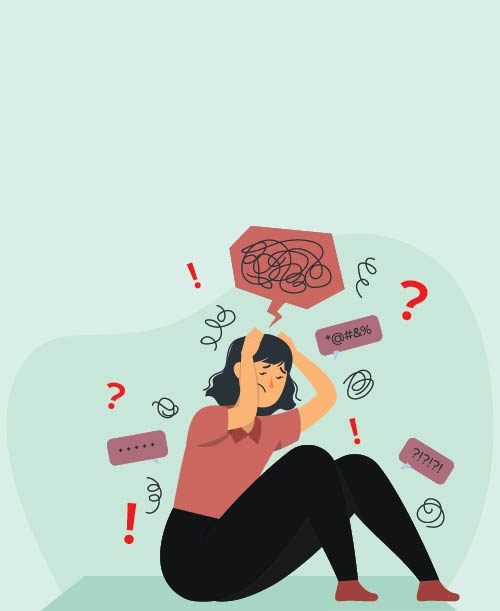

What Causes Extreme Mood Shifts in Women?
Have you ever noticed women feeling happy one moment and getting irritated the next? Have you wondered about the sudden change in their behaviour and mood?
Mood swings happen when you experience frequent episodes of happiness and sadness within a short period. Women are more likely to go through mood swings due to their hormonal changes. However, sometimes, women may also go through drastic shifts in their moods due to a mental health condition. Knowing the causes of these mood shifts will help you diagnose the issue and seek medical help without any delay to get rid of the symptoms. Read on to know more.
What is Mood Shift?
A mood shift refers to a noticeable change in a person’s emotional state. This can involve a transition from one mood to another, such as from happiness to sadness.
Sometimes, women feel a sudden shift in their moods without any trigger. They experience a sudden bout of happiness followed by a sudden episode of depression. These sudden mood swings in women are mainly due to the changes in their hormones.
However, in some cases, these extreme mood swings may signal a mental condition requiring immediate medical intervention.
Symptoms
The major symptoms of mood swing disorder are:
1. Mania
• Extreme happiness
• Highly energetic and creative
• Indulge in high-risk and foolish endeavours
• Spending a lot of money
• Increased speech
• Insomnia
• Increased irritability and aggression
2. Depression
• Feeling very sad and worthless
• Hopelessness and guilt
• Self-doubt
• Wanting to die
• Fatigue
• Irregular eating and sleeping patterns
• Inability to focus
3. Hypomania
Same symptoms as mania, but in less-intense episodes
What causes mood swings in women?
The major reason for mood swings in females is hormonal fluctuations. The causes that instigate this fluctuation are:
1. Premenstrual Syndrome (PMS)
• It affects around 90% of women
• 1 or 2 weeks before the menstrual cycle
• Mild to severe symptoms but can change every month
• Imbalances in oestrogen production
• Normalises after a couple of days of the menstruation cycle
2. Premenstrual Dysphoric Disorder (PMDD)
• Rare PMS condition, affecting only 5% of women
• Severe depression
• Medical intervention mandatory
3. Anxiety/Stress
• Worry/unhappiness or fear
• Constant stress that leads to severe mood swings in women
4. Pre-existing Mental Conditions
• Pre-existing mental conditions like depression, bipolar disorder, etc.
• Medical intervention mandatory
5. Imbalances in Hormone Production
• Imbalances in oestrogen production
• Hypothyroidism caused by improper functioning of the thyroid gland
6. Puberty
• Physical, mental, and emotional change in a woman
• Imbalances in hormone production
7. Pregnancy
• Physical and mental stress
• Irregular sleep and change in normal life immediately after childbirth
8. Menopause
• Reduced oestrogen production
• Medical intervention in case of extreme mood swings
How to deal with it?
Mood swings in women can be easily corrected when you follow these simple tips:
• Regular physical exercise every day
• Healthy diet
• Avoiding junk and processed foods
• Proper vitamin/calcium supplements after discussing with your doctor
• Regular mental conditioning exercises like yoga and meditation
• Getting 6 to 7 hours of sleep every night
Conclusion
Mood swings in women are mostly mild, and they are usually caused by hormonal fluctuations. However, if the symptoms persist for a long time and the episodes occur frequently, you must seek medical help right away. This will prevent it from becoming a more severe mental health condition.
One of the important components of our overall wellness is also being financially secured. Healthcare emergencies can happen any time, but a good health insurance policy can protect you from such uncertain situations. To know more about Wellness and other health related tips, visit the wellness corner.
Source: healthline.com, my.clevelandclinic.org
Disclaimer: This blog provides general information and discussions about health and related subjects. The information and other content provided in this blog, website or in any linked materials are not intended and should not be considered, or used as a substitute for, medical advice, diagnosis or treatment. Kindly contact your Doctor before starting a new medicine or health regime.
Related Articles
Does Crying Really Improves Your Mental Well-Being?
Types Of Emotions And Their Effect On Human Behaviour
Symptoms Of Depression In Teens
Dealing With Seasonal Affective Disorder In Monsoon
Seasonal Affective Disorder (SAD) - Symptoms And Causes
Published on August 2, 2024














 Health Insurance
Health Insurance  Travel Insurance
Travel Insurance  Car Insurance
Car Insurance  Cyber Insurance
Cyber Insurance  Critical Illness Insurance
Critical Illness Insurance
 Pet Insurance
Pet Insurance
 Bike/Two Wheeler Insurance
Bike/Two Wheeler Insurance  Home Insurance
Home Insurance  Third Party Vehicle Ins.
Third Party Vehicle Ins.  Tractor Insurance
Tractor Insurance  Goods Carrying Vehicle Ins.
Goods Carrying Vehicle Ins.  Passenger Carrying Vehicle Ins.
Passenger Carrying Vehicle Ins.  Compulsory Personal Accident Insurance
Compulsory Personal Accident Insurance  Travel Insurance
Travel Insurance  Rural
Rural